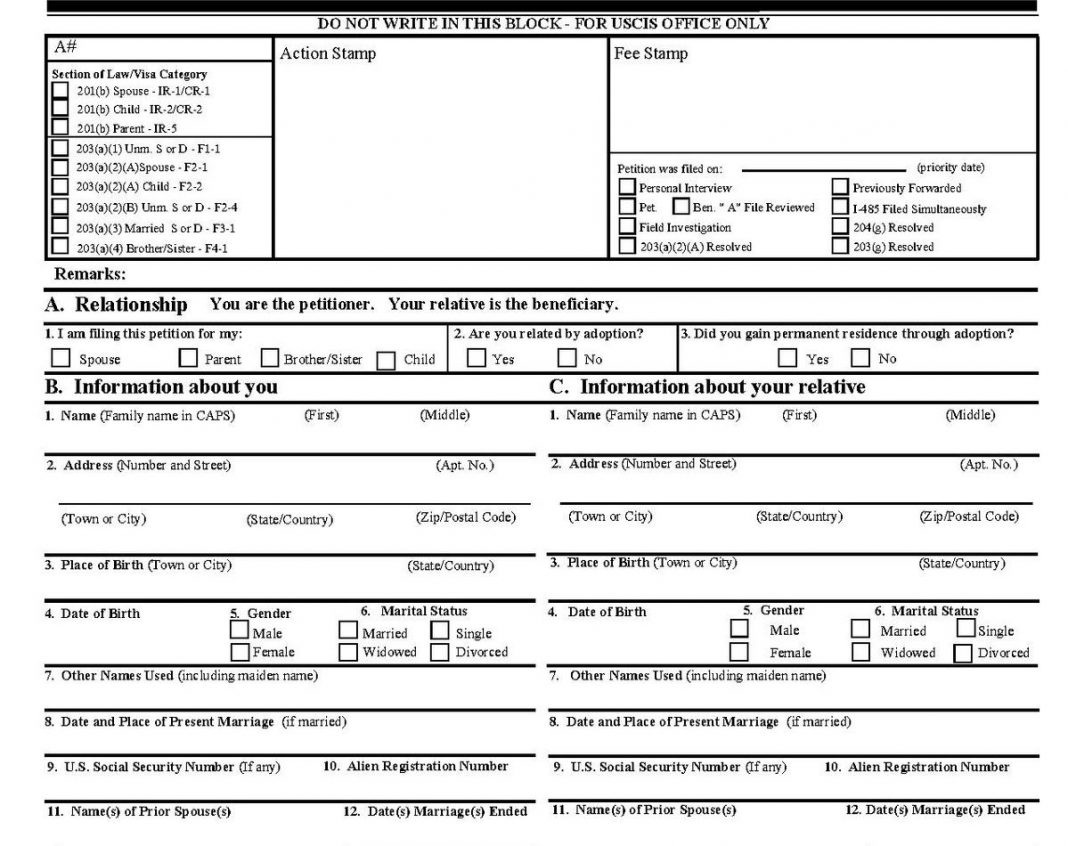Form I-130, officially known as the Petition for Alien Relative, is a document used in United States immigration proceedings. We initiate the family-based immigration process with this form, which allows U.S. citizens or lawful permanent residents to establish a familial relationship with an alien relative whom they wish to help immigrate to the United States. Learn more about the form i-130 petition for alien relative.
The United States Citizenship and Immigration Services (USCIS) is responsible for processing Form I-130. In our experience, this process is a critical first step for family members who aim to obtain a Green Card, thereby granting them permanent residency in the U.S. By filing this form, we provide necessary information about our relationship with the beneficiary, paving the way for them to apply for a visa.
Understanding the requirements of Form I-130 is essential for us as petitioners. It’s important for us to supply accurate information and supporting documents to establish the legitimacy of the relationship. The processing time for the petition varies depending on the USCIS workload and the specifics of our case. We must also be aware of the applicable filing fees and the potential need for additional steps following the approval of the petition. In case if you don’t understand adjustment of status lawyer can help you with this.
Eligibility and Filing Requirements
To successfully submit Form I-130, Petition for Alien Relative, understanding who is eligible to file and what documentation is required is crucial. We’ll guide you through determining eligibility, gathering the necessary documents, and understanding the fees involved.
Determining Eligibility
Form I-130 is intended for U.S. citizens and permanent residents who want to establish a familial relationship with certain family members, allowing these relatives to eventually seek a green card. To be eligible to file, the petitioner must be either a U.S. citizen or a permanent resident. The beneficiaries that may be sponsored include:
- Immediate Relatives: the spouse, unmarried children under 21, and parents of U.S. citizens (if the citizen is over 21).
- Family Members: includes unmarried children over 21, married children of any age, and siblings of U.S. citizens (if the citizen is over 21); or spouses and unmarried children of permanent residents.
Gathering Required Documents
Evidence is essential to prove your relationship to the beneficiary. Here’s what you’ll need:
- Proof of U.S. Citizenship or Permanent Residence: This might be a copy of a valid U.S. passport, birth certificate, naturalization certificate, or green card.
- Proof of Relationship: Such as a marriage certificate for a spouse, or a birth certificate for children.
- For married children, additional evidence to prove the legitimacy of the marriage is required.
Documentation must be complete and accurate to avoid delays. All foreign documents must be accompanied by a full English translation.
Understanding the Fees
The Form I-130 filing fee is determined by U.S. Citizenship and Immigration Services (USCIS) and is subject to change. As of our current knowledge cutoff, the fee is as follows:
| Beneficiary Relationship | Filing Fee |
| Immediate Relatives | $535 |
| Other Family Members | $535 |
Payment is typically made by check or money order, and it is non-refundable, regardless of the petition’s outcome. Always consult the USCIS website for the most current fee information.
Please remember to review the instructions provided by USCIS to ensure all requirements are met. This will optimize the processing of your petition and avoid unnecessary delays.
Filing Process and Aftermath
When filing Form I-130, it is crucial to understand the step-by-step process, expected wait times for USCIS processing, and the subsequent procedures following approval. Our aim is to guide you through each phase with precision and clarity.
Submitting the Petition
To begin, we complete Form I-130, also known as the Petition for Alien Relative, and mail it to the appropriate lockbox facility (Phoenix, Chicago, Dallas, or Elgin Lockbox), based on our current residence. The USCIS provides Direct Filing Addresses on their website for this purpose. Along with the form, we must include the correct filing fee and all required supporting documentation. It is possible to file Form I-130 concurrently with Form I-485 for an Adjustment of Status if the beneficiary is already in the United States and eligible.
USCIS Processing and Wait Times
Once USPS is completed, we can expect the USCIS to issue a receipt notice. Through the USCIS website, we can regularly check the status of our petition using the receipt number. USCIS processing times can vary and are influenced by the workload at each service center. We keep track of our priority date and compare it with the dates published in the monthly Visa Bulletin to gauge when our I-130 petition might be processed.
After Approval: Next Steps
Upon approval, USCIS forwards our case to the National Visa Center (NVC) for beneficiaries abroad. The NVC will instruct us on the next steps, which typically include paying visa fees, submitting necessary documents, and scheduling an interview at the U.S. Embassy or Consulate in the beneficiary’s country. For those adjusting status in the U.S., the approved I-130 helps establish a relative relationship when filing for a Green Card (Permanent Resident status) through USCIS.
